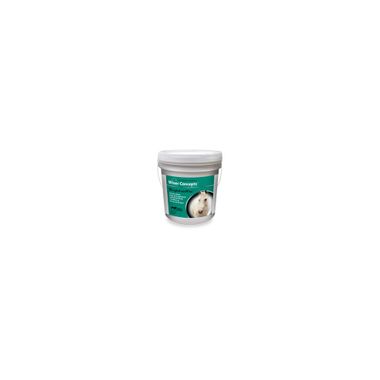SAVE 15% OFF 15% OFF Use Code EPX15 *

WeightGainWise Calorie-Dense / High-Fat Supplement for Horses
- Description
- Ingredients
- Directions
- Reviews
Description
WeightGainWise There are times in a horse’s life when a diet of hay and grain are just not enough. When a horse needs a healthy source of additional calories, you can count on WeightGainWise to provide them.
- Contains a concentrated blend of easy-to-digest, calorie-dense fats. Add as little as ˝ pound per day (8 oz) to the diet.
- Provides prebiotics and probiotics that support optimal digestibility of your horse’s ration and stimulates a healthy appetite.
- Supports a calm and focused attitude by reducing the hormone spikes related to excessive starch/sugar intake.
- Sustains healthy metabolism by providing calories low in starch and sugar.
WeightGainWise:
When health issues arise, always seek the advice of a licensed veterinarian who can help you choose the correct course of action for your horse. Supplements are intended to maintain healthy systems and support recovery and healing. They are not intended to treat or cure illness or injury.
Recommended for
- Chronic hard keepers
- Metabolically challenged horses
- Mares in late gestation and lactation
- Horses living in physically and mentally stressful conditions
- Horses recovering from injury or illness
- Horses with certain muscle disorders
- Horses that need extra calories in the cold winter months
- Performance horses, racehorses and show horses
- Sales weanlings and yearlings
- Senior horses
- Young horses in training
Veterinarians frequently recommend WeightGainWise to support horses who need extra calories, struggle to maintain a healthy body condition, or those with metabolic challenges that require a low starch/sugar diet.
Ingredients
| GUARANTEED ANALYSIS: | ||
|---|---|---|
| Crude Fat min | 50% | |
| Saccharomyces cerevisiae | 9x108 CFU/lb | |
| Lactobacillus acidophilus | 5x107 CFU/lb | |
| Enterococcus faecium | 3.5c106 CFU/lb | |
High-quality fat
The fat sources utilized in WeightGainWise include rice bran, ground flax, and flaxseed oil. Fat contributes positively to the diet in multiple ways. Fat does not cause the hindgut imbalances that high levels of starchy/sugary grains will, reducing the risk of grain overload and the dangers it presents. Once digested, fat is utilized without producing the extreme hormone spikes known to negatively affect temperament and glucose metabolism. Horses require a certain amount of fat in the diet to properly digest fat soluble vitamins such as A, D, E, and K.
The caloric density of fat makes it an incredible source of energy. Because fats contain 2.25 times the energy of carbohydrates, supplementation with fat can reduce the amount of starchy/sugary grains needed in the diet. By decreasing meal size and offering a diet rich in fat and fiber, horses become less prone to colic, laminitis, and insulin resistance-related disorders. Smaller meal sizes are also more attractive to picky eaters.
Fat is a wonderful energy source for performance horses. Research has proven that fat is a superior energy source when compared to high-starch grains and commercial concentrates. Scientific studies have shown that, during strenuous exercise, horses fed fat had lower lactic acid levels and lower heart rates than horses fed high-starch feeds. Because lactic acid causes muscle fatigue, horses fed fat had improved stamina and subsequent shorter recovery periods after exercise.
In broodmares, studies have shown that mares in good condition and positive energy balance (those who are not skinny or losing weight) have better conception rates. Adding fat to the diet allows breeders to keep mares in better condition without the risk of grain overload.
Growing horses raised on high-fat, high-fiber, low-starch diets exhibit a lower incidence of developmental orthopedic disease.
Direct-fed microbials
A healthy GI tract is essential in order for your horse remain in good condition. Along with nutrient absorption, the GI tract plays a significant role in the horse’s immune system and appetite stimulation.
Direct-fed microbials, such as Saccharomyces cerevisiae and Aspergillus niger, help to regulate pH (acid) balance in the GI tract, producing a hindgut environment that encourages beneficial bacteria to grow. When beneficial bacteria flourish the digestive tract operates at an optimal level, digestion improves, and horses utilize their feed more efficiently.
Lactobacillus acidophilus and Enterococcus faecium are two lactic acid-producing direct-fed microbes that researchers have been working with recently. Scientists have found that these lactic acid-producing bacteria also influence pH balance in the GI tract, which may play a role in boosting immunity levels.
When a horse’s digestive tract is healthy, his appetite is stimulated. Horses that feel good are less picky and more likely to clean up their feed.
Lecithin
Lecithin is a beneficial fatty acid that aids digestion and encourages maximal absorption of nutrients. Lecithin also contains choline, a factor necessary in the production of acetylcholine. As a neurotransmitter, acetylcholine is a critical component of the nervous system.
Directions
Feed 2 scoops (8 oz) daily. For best results, split into two 1-scoop (4 oz) servings.
As with any change in your horse’s diet, we recommend introducing WeightGainWise in small amounts and slowly increasing to the full serving (8 oz daily) over a period of a week to 10 days.
Storage and shelf life: Store WeightGainWise in a cool, dry place and keep lid tightly closed between uses. Shelf life is 18 months from date of manufacture when stored under suitable conditions.


